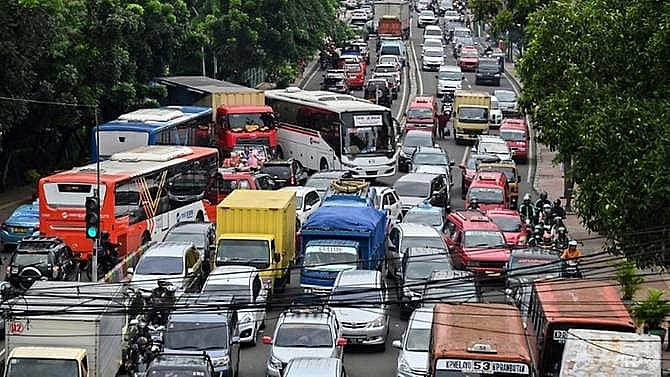Traffic-choked Jakarta to inaugurate mass rapid transit system
 |
| Authorities hope that the line linking central and southern Jakarta will cut carbon emissions and provide commuters some respite from the city's notorious traffic jams. (Photo: AFP/BAY ISMOYO) |
President Joko Widodo and other officials will attend a ceremony in Jakarta to give a green light for the 16km (10 mile) line, almost six years after construction began on the Japanese-backed project.
The train system runs above and below ground and stretches from the central Hotel Indonesia to the southern reaches of the Southeast Asian megalopolis of some 30 million people.
It aims to cut travel times between the two points to just 30 minutes from about two hours, offering some relief to frustrated commuters long used to spending much of their day stuck in traffic.
The new line is set to open to the public on Monday, with tickets slated to be free during the first week.
Construction on a second line linking downtown to Jakarta's northern port is also kicking off Sunday, with completion set for around 2024. More lines are envisioned in the future.
A separate elevated rail network is also being built to link satellite cities with Jakarta, nicknamed the Big Durian after the pungent fruit that bitterly divides fans and its detractors.
The public transit projects are part of a sweeping infrastructure push that Widodo hopes will boost the fortunes of Southeast Asia's biggest economy - and get him re-elected in national elections next month.
Over the past decade, rising incomes in the country of 260 million have created a ballooning middle class and sent vehicle ownership soaring.
But that's also brought hazardous air pollution and annual economic losses that run into the billions as cars crawl along the capital's roadways in the steamy tropical heat -- alongside an underused bus system.
Environmentalists hope that the new line will cut traffic-linked carbon emissions by about half.
It could also make a dent in annual economic losses of some 65 trillion Rupiah (US$4.6 billion) linked to road congestion, according to government figures.
Transport analysts, however, have cautioned that the new line and cheap prices won't cure the traffic woes of a city infatuated with private vehicles and with few decent sidewalks.
"The MRT won't immediately ease the traffic because changing the culture and attitudes isn't easy," Hendi Bowoputro, a public transit expert at the University of Brawijaya, told AFP before the inauguration.
And the line's expected 130,000 daily passengers represent only about 10 per cent of those who already cram into a decades-old commuter rail network.
What the stars mean:
★ Poor ★ ★ Promising ★★★ Good ★★★★ Very good ★★★★★ Exceptional
Related Contents
Latest News
More News
- Russian President congratulates Vietnamese Party leader during phone talks (January 25, 2026 | 09:58)
- Worldwide congratulations underscore confidence in Vietnam’s 14th Party Congress (January 23, 2026 | 09:02)
- Political parties, organisations, int’l friends send congratulations to 14th National Party Congress (January 22, 2026 | 09:33)
- 14th National Party Congress: Japanese media highlight Vietnam’s growth targets (January 21, 2026 | 09:46)
- 14th National Party Congress: Driving force for Vietnam to continue renewal, innovation, breakthroughs (January 21, 2026 | 09:42)
- Vietnam remains spiritual support for progressive forces: Colombian party leader (January 21, 2026 | 08:00)
- Int'l media provides large coverage of 14th National Party Congress's first working day (January 20, 2026 | 09:09)
- Vietnamese firms win top honours at ASEAN Digital Awards (January 16, 2026 | 16:45)
- ASEAN Digital Ministers' Meeting opens in Hanoi (January 15, 2026 | 15:33)
- ASEAN economies move up the global chip value chain (December 09, 2025 | 13:32)

 Tag:
Tag:




















 Mobile Version
Mobile Version